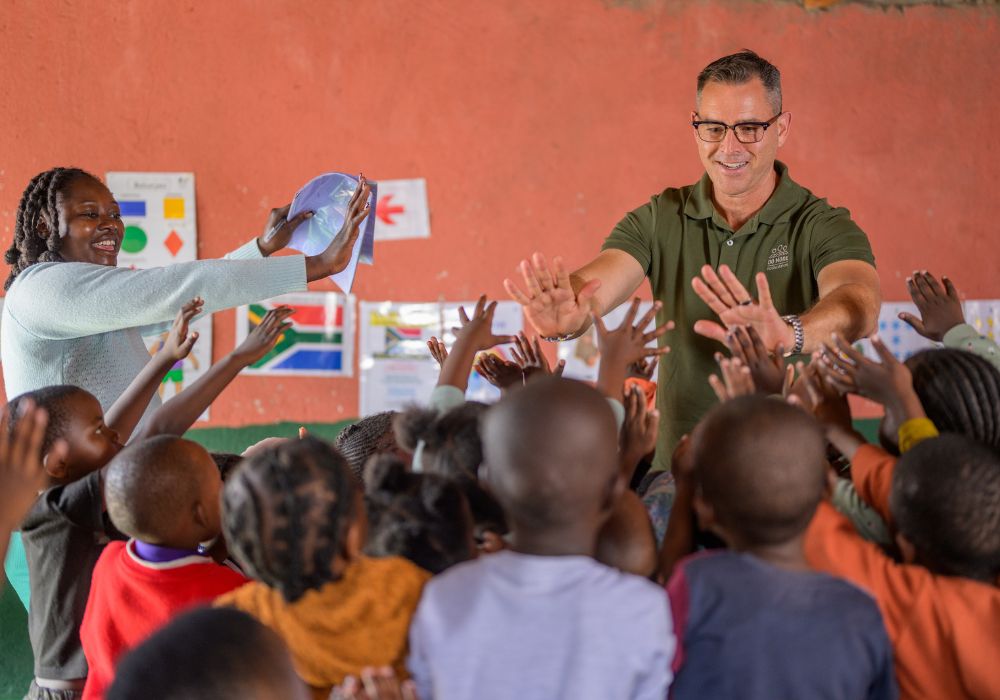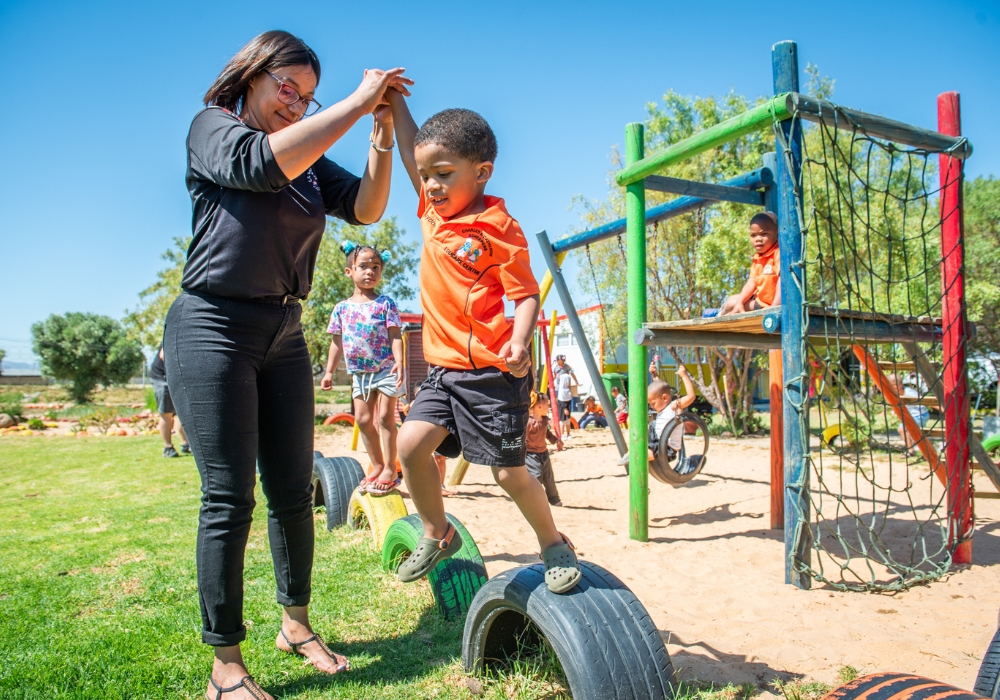From Charity to Catalyst: Rethinking Business Investment in Early Childhood Development
11 Apr 2025
At the recent Global Forum on Investing in Early Childhood, hosted by the Center for Business Champions and ECDAN, Warren Farrer, CEO of the DO MORE FOUNDATION, delivered a powerful presentation that challenged conventional notions of Corporate Social Investment (CSI).
His message was clear: for real change in the lives of young children, businesses must move beyond fragmented charitable giving and become strategic partners in systems change.
This article unpacks the key insights from Warren’s presentation and the DO MORE FOUNDATION’s experiences over the past eight years—offering five key learnings from the Foundation’s work at the intersection of the corporate world and the development sector on how businesses can invest in community wellbeing in ways that deliver lasting, measurable impact.
1. Why traditional CSI falls short
Many businesses in South Africa still treat CSI as an obligation—allocating a percentage of profit to a collection of short-term projects that often lack coordination, long-term vision, or alignment with core business goals. Despite R11.8 billion in CSI spend annually, outcomes remain limited.
“We’ve seen businesses scramble to allocate CSI funds at year-end without clear purpose or strategy,” Warren said. “This approach is not only inefficient, but it misses the opportunity for business to contribute meaningfully to building resilient, thriving communities.”
Historically, CSI initiatives have often been associated with one-off projects, superficial donations, or media-driven gestures, leading to unintended consequences such as community mistrust and limited measurable impact. To shift this narrative, CSI must move beyond short-term interventions and commit to long-term, community-driven engagement. By fostering meaningful relationships, acknowledging the real needs of communities, and aligning efforts with systemic change, CSI can become a powerful enabler of sustainable impact and new opportunities.

2. Everyone Gets to PLAY: A new model for strategic CSI
The DO MORE FOUNDATION’s Everyone Gets to PLAY (EGTP) model is a collective impact approach to community development work. The model offers a tangible alternative. Launched in 2023, EGTP aligns with South Africa’s National Integrated ECD Policy and brings together public, private, and civil society actors to deliver a comprehensive “basket of services” relevant for young children in vulnerable communities. These services include:
- Early learning through play
- Parenting and caregiver support
- Nutrition and food security
- Child protection and psychosocial care
- Infrastructure upgrades and local enterprise development
What makes EGTP powerful is its ability to mobilise diverse actors around a shared vision, grounded in evidence and driven by local ownership. The model grows with investment and adapts to new community contexts. The key takeaway is that flexible development models can scale effectively while staying relevant. By keeping core principles consistent but tailoring implementation to local needs, communities remain at the centre of the approach.
“EGTP is not a campaign. It’s a platform for sustainable community development with the young child at its centre,” says Dr Jessica Ronassen (DO MORE FOUNDATION Advocacy and Innovations lead). The success of a collective impact model relies heavily on individual organizations within the collective investing time, effort, and energy to align with a shared vision, create opportunities for collaboration, and foster meaningful communication.

3. The role of a backbone organisation
EGTP is made possible through the work of a backbone organisation—a concept rooted in collective impact theory. As a backbone, the DO MORE FOUNDATION facilitates coordination, enables cross-sector collaboration, and supports systems strengthening. This involves:
- Hosting shared community forums
- Aligning partners under a common agenda
- Building local capacity
- Supporting data and learning systems
Unlike a typical implementing NGO, the backbone doesn’t “own” the work—it holds the space for others to contribute meaningfully.
“Backbone organisations exist to support, not to replace. Our job is to enable others to lead, collaborate, and build systems that last long after we’re gone.” The concept of a backbone role is well-documented in Kania & Kramer’s (2011) Collective Impact framework, which emphasises the importance of a dedicated organisation to coordinate and sustain collaborative efforts. Backbone organisations provide structure, facilitate alignment among stakeholders, and drive systemic change without taking over the leadership of initiatives.
 (2).jpeg)
4. Lessons from the ground: Nkomazi and Worcester
Practically, one might ask: What does it truly mean to remain in a community while being deeply invested in building relationships, fostering partnerships, and mobilising collective action to elevate the profile of young children and their needs? It means being present beyond a single intervention, listening to the evolving priorities of the community, and working alongside local stakeholders to create sustainable, long-term solutions that prioritises children.
Two communities illustrate the power of this approach in action:
- Nkomazi (Mpumalanga): What began as a pilot in two ECD centres has now expanded to 70 ECD programmes across 19 villages. A local steering committee, traditional authorities, and NGOs now co-lead the work.
- Worcester (Western Cape): The DO MORE FOUNDATION helped establish a Young Child Forum that brought all relevant actors—including departments of health and education, municipal leaders, and community organisations—into one space. This collaborative platform helped influence municipal policy and unlock budget allocations for ECD.
These are not “feel-good” stories. They are proof of concept that when business-backed coordination meets local leadership, systems change is possible.
5. Business as a catalyst: How CSI can evolve
So, what should businesses do differently?
- Focus: Choose one strategic issue—like ECD—where you can commit long-term.
- Partner: Work with trusted, neutral backbone organisations that understand systems change.
- Align: Make sure your CSI reflects your brand purpose and values.
- Empower: Co-create with communities and let local voices lead the way.
“We’re inviting businesses to the playground—not just to fund projects, but to help build platforms that change lives.” CSI should no longer be about ticking boxes. It should be about strategic investment in the kind of future we all want—starting with young children.
Conclusion: We grow what matters
This approach is deeply aligned with the broader purpose journey of RCL FOODS—“We grow what matters.” And what matters most? Young children. Their potential. Their futures.
The DO MORE FOUNDATION’s model shows that business can be more than a donor. It can be a catalyst for systems change and a key role-player in the sustainable development of communities.
The invitation is to shift our focus—from how much we give to how much impact we can create when we invest with purpose.
Call-to-action
If you're a business, policymaker, or social impact leader interested in being part of this journey, we would love to connect.
The Everyone Gets to PLAY model is growing, and there’s a seat at the table for everyone who believes in building better tomorrows for young children.
Contact Kris.Fenton@domore.org.za to learn more or explore a partnership